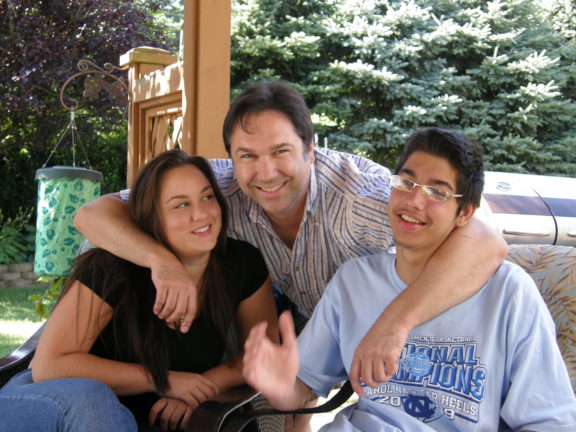Nashville songwriter turns to film and video after the tragic loss of his daughter. Meet John Hamlin who demonstrates how a real-world tragedy can be the catalyst for positive change and new direction at any age. In this podcast he speaks to the searing loss and how, today, his late daughter leaves “breadcrumbs” to help him navigate a new life of advocacy through visual storytelling.
Q: Let’s start with Woodstock. I know a few folks have been there, much less lived there. What was that like?
A: After I got separated, I moved to Woodstock because it was still two hours from my wife and kids. Woodstock is synonymous with that famous three-day concert in 1969, and it’s synonymous with freedom, if you will. And as a songwriter and musician, I was drawn to Woodstock because of its history more than the concert. My childhood heroes like Bob Dylan and the band lived there in the ’60s and they were recording all this groundbreaking music and Hendricks and George Harrison and Van Morrison would spend time there with them. It was kind of cool to be writing and performing songs there, sometimes at the same tiny bar where Dylan would debut songs he was writing. It was just great to be up there during a sort of tentative time in my life when I was separated. I even got to help out on the last album recorded by the group called The Band.
Tell us a bit about your life and how you ended up from there to Nashville.
A: I had like a typical childhood until I was about nine. I was the one who witnessed my father cheating on my mom and my sisters did not. My parents didn’t know how to handle it. They took bad advice and they told me not to talk about it. They pretty much swept me and the affair under the carpet and treated my siblings totally differently and separately than they treated me in the same house.
That colored the way I perceived and handled everything. I mean, I grew up believing I was different and not in a good way, that there was like something wrong with me. And then I found music and there was something about the world of music and putting on headphones and hearing other inspirations and other influences. It would carry me places I had never been before, and these were places you can’t go with your eyes open. Music was not a distraction. Music was an interest, and a passion and music really became my best friend. I decided to move to Nashville and focus on songwriting. I needed a change of scenery too because that separation was turning into a divorce. I moved to Nashville, got involved on Music Row, bought my first house in Madison in 2009. That’s how I got here.

Q: Your company is called Let ‘Em Fly, and it took me a bit to realize the origin of the name. Will you share a bit about how you came to that name, as well as how you got into filmmaking from music?
A: Well, Let ‘Em Fly, just to hear that phrase to me means to let go, to release, to not hold back, to take risks. There’s also a connotation there to open fire. But for me, Let ‘Em Fly is a tribute to my daughter Emily who passed away suddenly a few years ago. She’s my inspiration. Let ‘Em Fly is Let Emily Fly, sort of unfettered of earthly conditions. We tend to, “I miss you. I miss you,” and everybody… It’s almost like we’re holding them here and Let ‘Em Fly to me says she’s got a whole new thing to do now.
She continues to leave me breadcrumbs, if you will, just enough to get to where I need to get. I don’t get to see too far into the future. I’d follow those breadcrumbs, and then there’s another set of breadcrumbs. She is not just my inspiration. I really feel like she is my co-pilot at this point, and it took me a while to understand that. I lost a couple of years of my life after Emily passed. There is no other loss like losing a child. It does no use to compare to other losses, but I’ve had other losses that made me very, very sad.
And one day, I had an inspiration to make a film, and I don’t know where it came from at the time. I know now that it was my daughter saying, “Get the heck off the couch and live.” When you get an inspiration, this is a really big deal to share I believe.
You can’t convince me that wasn’t my daughter pushing me to do something more. I decided to make a film about East Nashville, its history and its music scene mainly. I started contacting all these artists who didn’t know me and scheduling appointments and telling them what it was about. And suddenly, I was not grieving 24/7. Part of my life was now dedicated to something new, something I was passionate about.
I was getting familiar with the camera. At the same time, I was trying to make them comfortable in an interview while grieving. Somehow, I shot 200 hours of footage and I was ready to go, but nobody would edit my film. Who is going to edit for free 200 hours of footage? It takes 200 hours just to watch it, let alone start editing it into a one-hour film. I was forced to edit this film myself, which meant learning editing which I knew nothing about. More breadcrumbs from Emily, because out of this came a freelance editing career for me.
Q: Tell us more about some of the topics and/or the videos that you’ve produced?
A: Almost everything that I produce is mostly me, until the very end when I need to include actors or people who give me opinions on what I’m editing. But all of my filmmaking endeavors, whether it’s a music video or a documentary or a narrative film, have all been therapeutic. It is as much for me to create the topic I’m interested in as it is keeping myself in the game. This keeps me interested in life, no matter what the topic is. But looking back, many of my topics come back to my daughter.
Here I was making a film to help me get through my grief about people who were doing the same. These topics seem to show up in my film. And sometimes it’s about the underdog. I’ve always been for the little guy. Whoever the underdog was who was bullied by the big guy, the bigger entity, the corporation, I tend to side with the little guy and want to share those kinds of stories.
Q: Will you share how we met [through FiftyForward]?
A: Yeah. My neighbor Anne is a good friend of mine and my house and hers shares a fence between our backyards. I noticed online in the fall of 2020, Metro Arts was asking for submissions where they would give you a grant to make a film about a Madison organization during the pandemic. I chose FiftyForward because there was a story there.
I just felt there was a compelling documentary here, because FiftyForward is an organization which aims to help older adults feel less isolated and the pandemic was working really hard to do the opposite. I thought a short film about FiftyForward and how important it is to the community and how FiftyForward adapted when they could no longer gather older adults would make for a good film and shine a light on FiftyForward as one of the more important organizations in the Nashville area.
Q: You are just finishing a project that illuminates some history that many people didn’t know about, tell us more about your Tulsa project.
You’re speaking about my fifth film, which is the Tulsa race massacre. A friend of mine had mentioned to me about two years ago that in 1921, there was a race riot in Tulsa where at least 300 black people were killed in a matter of 18 hours. I was astonished like; how could I have never heard about this? I started to ask friends of mine of different ages and different ethnic backgrounds and most people have never heard about this. How could this have happened? Well, they swept it under the carpet. And again, this is sort of my theme.
This is a group of people who were bullied by a larger group of people who were allowed to get away with it. When you’ve got the mayor and the police and the newspaper all on one side, you can pretty much sweep it under the carpet when there’s no Facebook and Twitter. It was sparked by an incident in an elevator with a white girl and a black boy who seemed to be romantic. There was a scream and it was assumed that she was attacked, which she said later she was not, and the white folks gathered.
They wanted the life of this young black fellow who was being held on the sixth floor of a courthouse. And when they couldn’t have him to lynch, they burned down Black Wall Street, Greenwood neighborhood of Tulsa. I’m currently editing right now. I’m in post-production.
Learn more about John (https://www.letemfly.net/) and how his struggles have propelled his passion and his life’s work: to live in the moment, to give back, and to share stories that are often unspoken. Perspective is everything.
If you or someone you know is dealing with loss and is need of resources, our support groups are a good starting place to find comfort and connections – https://fiftyforward.org/support-groups/. In addition, the NMHA is a great resource for those struggling with mental health and anxiety learn more here.


